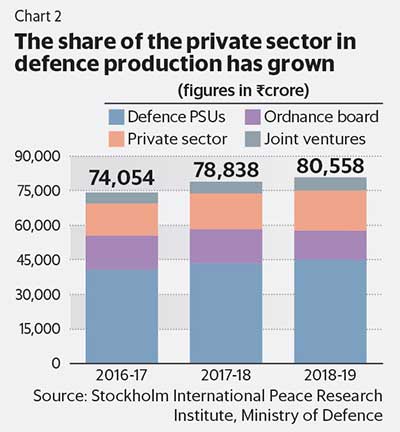Relevance: GS-2: Government policies and interventions for development of various Sector
Key phrases: Defence manufacturing, Private Industry, Defence Production and Export Promotion Policy 2020, Aatmanirbhar Bharat, iDEX
Why in News?
-
“Defence R&D will be opened up for industry, start-ups and academia with 25 per cent of defence R&D budget earmarked. Private industry will be encouraged to take up design and development of military platforms and equipment in collaboration with DRDO and other organisations through SPV model,” Sitharaman said in her speech.
Defence manufacturing industry in India:
- The Indian defence manufacturing industry is a significant sector for the economy. The industry is likely to accelerate with rising concerns of national security.
- India’s defence manufacturing sector has been witnessing a CAGR of 3.9% between 2016 and 2020.
- The Indian government has set the defence production target at US$ 25.00 billion by 2025 (including US$ 5 billion from exports by 2025).
- Defence exports in India were estimated to be at US$ 1.29 billion in 2019-20. India’s defence import value stood at US$ 463 million for FY20 and is expected to be at US$ 469.5 million in FY21.
- Defence exports in the country witnessed strong growth in the last two years. India targets to export military hardware worth US$ 5 billion in the next 5 years. As of 2019, India ranked 19th in the list of top defence exporters in the world by exporting defence products to 42 countries.

Private Industry Participation in Defence Manufacturing
-
Since 2016-17, the earliest for which such data is available, there has been a gradual shift away from the public sector to the private sector. The share of the private sector in total defence production has risen from 19% in 2016-17 to 22% in 2018-19. In the same period, the share of the public sector (DPSU plus ordnance board) has decreased from 75% to 72%.

Constraints for Private Industry Participation in Defence Manufacturing:
- First and foremost, there is a well-entrenched public sector i.e. DRDO, Defence PSUs & Ordinance Factories, designed to meet the operational needs of defence services, is well established in terms of infrastructure, skilled manpower & manufacturing facilities. It is therefore not surprising, these companies get most of the major defence equipment contracts Any gaps existing in public sector is being made up by the private sector through outsourcing/subcontracting. In this scenario, the private industry acts only as second alternative with scope only for spill over/leftovers participation in defence projects
- Secondly, the private sector is being looked upon to bring in modern technology besides speeding up production process to make up for critical deficiencies. There is thus a need to acquire technology from foreign OEMS as the industry is not yet geared for development of indigenous defence technologies. This is not a simple matter as there are broad trends in military industrial technologies that are regarded as critical by the major powers for developing their strategic military capabilities and as important from the perspective of export controls.
- Thirdly, unlike other industrial sectors, the response to Foreign Direct Investment (FDI) in defence sector is not encouraging at all. As per the FDI policy announced in June 2020, FDI beyond 76% has now been per mitted through government approval route, in cases resulting in access to 'modern technology in the country. Earlier, foreign OEMs were required to form JVs with domestic firms if they wanted to establish a manufacturing base in India.
- Fourthly, there are inherent contradictions in the process for selection of strategic partners, Selection of partners for long term partnership seems to be the most complicated part as no Indian company has under taken a major weapon system programme on its own. It is logical to assume that Strategic Partners (SP) are selected only after verified physical performance following the regular RFP process. However, this is at variance with the suggestions made by the Task Force set up by the ministry of defence (MoD) to evolve an eligibility criteria for selection of SPs from private sector.
- In private sector, there is limited experience and expertise in relation to defence production and even lesser in relation to final integration of complex defence systems & subsystems. Therefore, instead of experience in defence manufacturing, competence in integration of multidisciplinary functional systems, system engineering and manufacturing capability should be primarily looked for.
Government Initiatives to promote private sector participation in Defence sector:
There are following measures have been taken by the Government to promote private sector participation in Defence sector:-
- Government formulated the ‘Defence Production and Export Promotion Policy 2020’ to provide impetus to self-reliance in defence manufacturing under the ‘Aatmanirbhar Bharat’ scheme. The ministry aims to achieve a turnover of US$ 25 billion, including an export of US$ 5 billion in the aerospace and defence goods and services by 2025.
- The 2020 policy has introduced a new category ‘Buy (Global-Manufacture in India)’ to encourage foreign OEMs to setup “manufacturing or maintenance entities through its subsidiary in India". The new guidelines encourage the manufacturing of the entire equipment rather than just components and spares. Additionally, domestically developed defence platforms must now have at least 60% Indian content.
- The Government of India has enhanced FDI in Defence Sector up to 74% through the Automatic Route for companies seeking new defence industrial license and up to 100% by Government Route wherever it is likely to result in access to modern technology or for other reasons to be recorded.
- An indigenization portal namely SRIJAN has been launched in August 2020 for DPSUs/OFB/Services with an industry interface to provide development support to MSMEs/Startups/Industry for import substitution.
- Government has notified a ‘Policy for indigenisation of components and spares used in Defence Platforms’ in March 2019 with the objective to create an industry ecosystem which is able to indigenize the imported components (including alloys & special materials) and sub-assemblies for defence equipment and platform manufactured in India.
- Government has established two Defence Industrial Corridors, one each in Uttar Pradesh and Tamil Nadu. So far, investment of approx. Rs 3342 Cr has been made in both the corridors by public as well private sector companies. Moreover, the respective State Governments have also announced their Aerospace &Defence Policies to attract private players as well as foreign companies including Original Equipment Manufacturers (OEMs) in these two corridors.
- An innovation ecosystem for Defence titled Innovations for Defence Excellence (iDEX) has been launched in April 2018. iDEX is aimed at creation of an ecosystem to foster innovation and technology development in Defence and Aerospace by engaging Industries including MSMEs, Start-ups, Individual Innovators, R&D institutes and Academia and provide them grants/funding and other support to carry out R&D which has potential for future adoption for Indian defence and aerospace needs. The scheme aims to benefit 300 new Startups for innovative design and development in defence sector.
- Defence Investor Cell (DIC) has been created in Feb-2018 in the Ministry to provide all necessary information including addressing queries related to investment opportunities, procedures and regulatory requirements for investment in the sector.
Way forward:
- Aligned with the Prime Minister’s Aatmanirbhar Bharat agenda, the government’s commitment to promoting self-reliance and indigenisation by leveraging Indian industry is once again reinforced with the 68 per cent (enhanced) domestic allocation for defence capital procurement. Earmarking 25 per cent of defence R&D budget for industry, start-ups and academia is a forward-looking measure that will pave way for investments in frontier technologies and capability development.
- To build a defence industrial base, the government should consider supporting the private sector in India and trusting the private sector with bigger and stable defence contracts. Supporting research and development, and design and manufacturing capabilities of the private sector are vital for increasing defence production in India.
- Industry in partnership with DRDO through SPV mode for the development of critical weapon systems and military platforms is a path-breaking reform that will significantly transform the Indian defence eco-system and lead India to be a net-exporter of defence equipment/platforms.
Source: The Hindu BL
Mains Question:
Q. “For export of US$ 5 billion in the aerospace and defence goods and services by 2025, private sector participation is important in defence production in India.” Critically analyse the statement.







